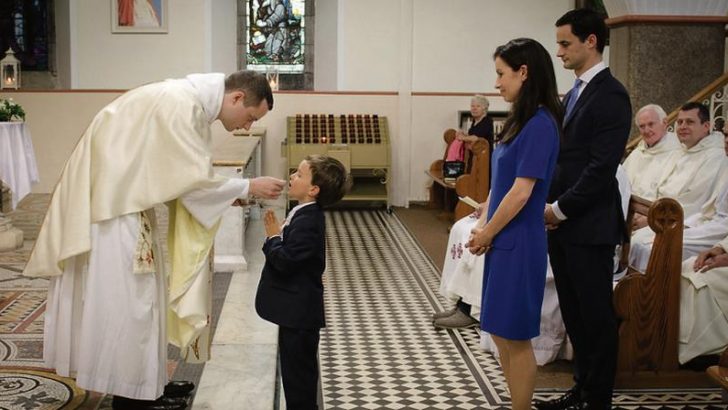Personal Profile
There’s more to our beliefs than meets the eye, writes Colm Fitzpatrick
Renowned Doctor of the Church, St Thomas Aquinas once opined: “Beware the man of a single book” – but for Fr Conor McDonough OP, this is a warning that he needs not fear. The 32-year-old Dominican friar who hails from Salthill in Galway and is now teaching theology in Dublin has continually championed the view that faith and reason go hand in hand. With a Cambridge-educated background and a sharp mind to accompany his spiritual vocation, Fr Conor is an able defender of the rationality of our Faith.
His journey to this point in his vocation began when he was young, with a family who encouraged him to encounter the Church.
“Faith was very much part of family life, there’d be family prayer, we’d go to Mass together, and so it was just an ordinary part of our life at home. My parents have a very strong faith and so it was just part of the family, Jesus was part of the family in that sense. We’d pray about things we were going through and so on,” Fr Conor says.
Solid witness
He adds that his parents were formative in their distinct ways, with his mother having a “very overt” faith, while his father is a “quieter” but very solid witness. Combined with this religious devotion, Fr Conor also stumbled upon the works of St Thomas Aquinas as a teenager, and after reflecting on them diligently realised that there are also intellectual foundations to the Faith.
“So that was very, very important. Ever since then it’s been a continuous journey of the two together all the time. So, believing, praying, witnessing, evangelising but also asking myself questions all the time and being challenged all the time by people around me,” he explains.
With this perspective in the back of his mind, Fr Conor headed to Cambridge at age 17 to study science and it was there that his passion for the Faith came to the forefront.
“I went to Cambridge to study science, and so there I was at King’s College Cambridge, and the vast majority of my friends weren’t believers. So, suddenly I’m in a completely different context, and it meant I had to ask myself if what I believe is actually true.
“And so, I found myself being constantly challenged in a good-natured way by my friends and also I found my way to the Catholic chaplaincy,” he says.
He thanks the “amazing community” at the chaplaincy, where books were shared, meals were eaten, and prayers were offered, for strengthening and enabling him to interact with those friends who didn’t believe in God, and offering reasons for his own beliefs.
“My friends were generally liberal, and they were genuinely interested in hearing what I had to say. So, I look at university now and I say, in Ireland especially, they’re really hostile atmospheres whereas I had loads of questions being thrown at me all the time but people would patiently listen to my answers as well and we would have long discussions up to three in the morning in the college bar about the meaning of life, or whatever it might be. So that was very important to me, that environment,” he says.
Fr Conor stresses that these experiences were particularly formative because during his schooling and in his parish, he was “rarely” given reasons for believing the Faith.
“I think most of my friends with the same experience, they just presumed that there is no reason why they believe what they believe and it’s just an infantile sort of faith,” he says.
It was at Cambridge that Fr Conor’s vocation for the Dominicans was born, impelling him to switch degree courses to Theology. After graduating he taught in Yorkshire for two years, a time which he says allowed him to grow up “in every other respect”. The year prior to being ordained in 2016 with eight other deacons on the 800th anniversary of the order’s establishment, he was sent to Switzerland for further studies which included a masters degree and licentiate, lasting three years in total.
Supportive
“My parents were great. They were very supportive, there was never any pressure to think about becoming a priest. That wasn’t something that was kind of pushed on me at all, but they were very supportive. I think for my family in general, the difficulty is just how society is going to react to me. It’s not so much about how they’re going to react to me but how the Irish cultural context views somebody like me,” he says.
“So, their concern was a loving concern and my friends were great as well. A lot of them don’t practice but they’re really supportive and interested in what I do.”
Fr Conor is now teaching theology at Dublin’s Dominican House of Studies, and describes it as a “huge privilege” and “joy” to be given an opportunity to have an influence on every sermon these future priests will ever preach. He adds that alongside his enthusiasm for teaching, he is emboldened by the youth across Ireland who are standing up for the Faith despite the hostility they may encounter.
“I just see so many young people who are courageously counter cultural. They’re just totally standing up from their milieu and they’re really just courageous for the Lord and I see them with their projects and it’s just so exciting…”
There are currently 20 Dominicans serving at Dominick Street’s St Saviour’s Church. The Divine Office is prayed every weekday at 6pm.


 Colm Fitzpatrick
Colm Fitzpatrick Fr Conor McDonough (File Photo)
Fr Conor McDonough (File Photo) 